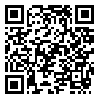دوره 10، شماره 1 - ( زمستان 1400 )
جلد 10 شماره 1 صفحات 10-1 |
برگشت به فهرست نسخه ها
چکیده: (2400 مشاهده)
Objective: Given the importance of COVID-19 consequences and students’ health, this study aimed to predict the fear of COVID-19 based on spiritual well-being and self-efficacy among Iranian university students by focusing on the mediating role of mindfulness.
Methods: This study was a descriptive correlational study. An online sampling method was used, and the sample included 396 university students in Tehran City, Iran. Mindful Attention Awareness Scale (MAAS), general self-efficacy scale, fear of COVID-19 scale, and Paloutzian and Ellison’s spiritual well-being scale were used for data collection. An independent t test, the Pearson correlation, and the regression test were used to analyze the obtained data.
Results: The results show that the overall effects of religious well-being (β=-0.192, P=0.001), existential well-being (β=-0.227, P=0.001), and self-efficacy (β=-0.093, P=0.013) were significant. The indirect effects of religious well-being (β=-0.026, P=0.001), existential well-being (β=-0.013, P=0.016), and self-efficacy (β=-0.04, P=0.001) were significant, too. The direct effects of religious well-being (β=-0.253,P=0.001), existential well-being (β=-0.205, P=0.016), and self-efficacy (β=-0.133, P=0.013) were significant, as well.
Conclusion: Spiritual well-being, self-efficacy, and mindfulness are associated with a reduction in perceived fear of COVID 19 in Iranian students, and mindfulness has a role in these relationships.
Methods: This study was a descriptive correlational study. An online sampling method was used, and the sample included 396 university students in Tehran City, Iran. Mindful Attention Awareness Scale (MAAS), general self-efficacy scale, fear of COVID-19 scale, and Paloutzian and Ellison’s spiritual well-being scale were used for data collection. An independent t test, the Pearson correlation, and the regression test were used to analyze the obtained data.
Results: The results show that the overall effects of religious well-being (β=-0.192, P=0.001), existential well-being (β=-0.227, P=0.001), and self-efficacy (β=-0.093, P=0.013) were significant. The indirect effects of religious well-being (β=-0.026, P=0.001), existential well-being (β=-0.013, P=0.016), and self-efficacy (β=-0.04, P=0.001) were significant, too. The direct effects of religious well-being (β=-0.253,P=0.001), existential well-being (β=-0.205, P=0.016), and self-efficacy (β=-0.133, P=0.013) were significant, as well.
Conclusion: Spiritual well-being, self-efficacy, and mindfulness are associated with a reduction in perceived fear of COVID 19 in Iranian students, and mindfulness has a role in these relationships.
نوع مطالعه: پژوهشي |
موضوع مقاله:
رويكرد شناختي رفتاري
دریافت: 1400/7/23 | پذیرش: 1400/9/18 | انتشار: 1400/10/11
دریافت: 1400/7/23 | پذیرش: 1400/9/18 | انتشار: 1400/10/11
| بازنشر اطلاعات | |
 |
این مقاله تحت شرایط Creative Commons Attribution-NonCommercial 4.0 International License قابل بازنشر است. |


